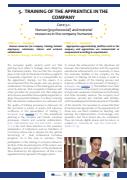5. TRAINING OF THE APPRENTICE IN THE COMPANY Core 5.1. Human (psychosocial) and material resources in the company humanos ITEM 5.1.1Company Human resources for company training include: employees, volunteers, interns and external collaborators Completely / Enough / Something / Nothing The European quality systems point out that planning must reflect a strategic vision shared by the interested parties. The role that the company plays in the Dual Professional Formative programs is especially important, as it is co-responsible for the apprentice’s training. For this reason, it is recommended that the people who are going to collaborate in this phase of the training process be correctly planned, that cooperation initiatives with other providers be projected and that adequate and inclusive associations be explicitly supported to apply the projected initiatives. It is about ensuring that educational achievements are achieved and the quality of training processes is improved. All this promotes a culture of quality and improves confidence in the presentation of training [1. European. See: EQAVET P4, I1]. This educational planning in the company will include: volunteer employees, interns and external collaborators. [two. International. See: ISO 21001:2018 – Section 7.1.2.1] We must draw attention to the necessary participation of institutions such as Chambers of Commerce whose role is decisive for the optimal functioning ofDual Professional Formative programs, as is the case in Germany. Their participation in the training of company trainers is another of the relevant aspects of this system, as is the regulation and recognition of the professional titles obtained by the apprentices. All this is duly regulated and recognized in the legal system.ITEM 5.1.2Company Appropriate apprenticeship facilities exist in the company and apprentices are remunerated or compensated according to requirements Completely / Enough / Something / Nothing To ensure the achievement of the objectives set between the interested parties, and the expected educational achievements, it is necessary to have the necessary facilities in the company for the provision of training. All this is timely in order to ensure the quality of the training process and improve confidence in the provision of training [1. European. See: EQAVET I1]. The facilities must meet the requirements of the student, including buildings and grounds; equipment (hardware and software); and other necessary services. The company must determine, provide and maintain safe facilities, which are adequate for the development of the skills of the students. It is necessary to ensure that their dimensions are appropriate to the requirements of those who use them. Facilities for teaching, self- learning, the implementation of knowledge, rest, recreation and food should also be considered. They can include digital spaces and be indoor or outdoor [2. International. See: ISO 21001:2018 – Section 7.1.3].
